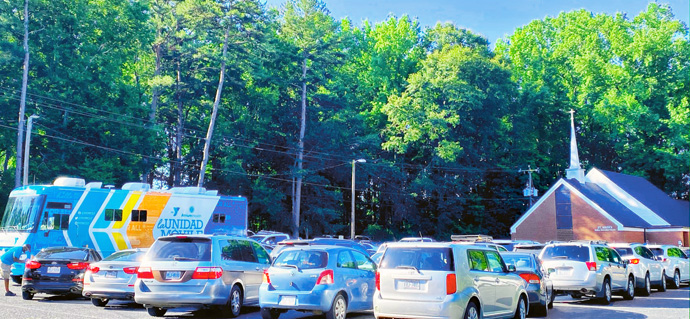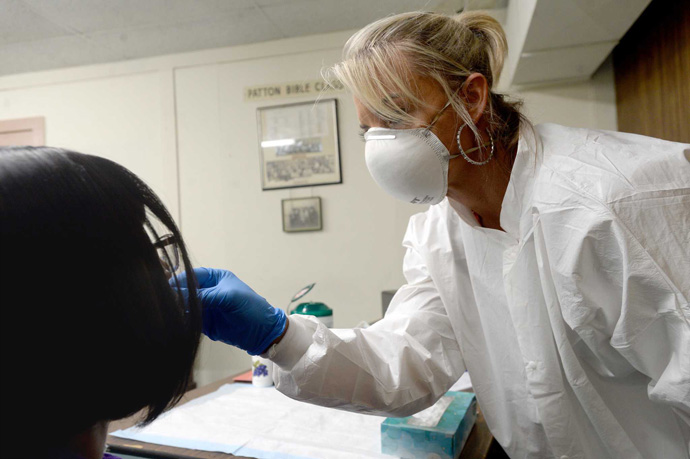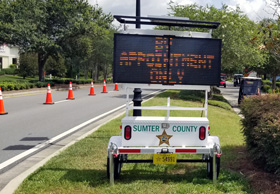Sitting in the 28217 ZIP code of Charlotte, North Carolina, St. Mark’s United Methodist Church is in the middle of a COVID-19 hot spot.
This African American community, in North Carolina’s largest county, considered its precarious situation a “clarion call,” said the Rev. Stephanie Moore Hand, an ordained deacon on the Metro District staff in the Western North Carolina Conference.
On June 26, St. Mark’s leaders invited Atrium Health Care COVID-19 Mobile Testing Facility to their campus. From 6 a.m. to 3 p.m. cars lined the streets around the church for free screening.
Hand said more than 250 cars joined the caravan.
“African Americans comprise approximately 36% of the population in Charlotte, Latinos 14%. However, the (number of) COVID-19 positive cases has been higher for these two populations,” said Fernando Little, St. Mark’s music director and an Atrium Health staff member. “In addition to the disparity in positive cases, there was a glaring gap in the percentage of African Americans and Latinos being tested.”

The Atrium Health Care COVID-19 Mobile Testing Facility was set up June 26 on the campus of St. Mark’s United Methodist Church in Charlotte, N.C., in the Metro District. St. Mark’s is in one of the African American communities in Mechlenburg County. More than 250 cars got in line. Photo courtesy of the Rev. Stephanie Moore Hand, Western North Carolina Conference.
In Beaumont, Texas, along the upper Gulf Coast, two United Methodist churches worked together to create a pop-up testing clinic.
The Rev. Tommy Williams, pastor of Trinity United Methodist Church, was pondering how to serve Beaumont in a time of COVID-19 restrictions. He also was worrying about how hard the virus was hitting racial-ethnic groups.
He approached the Rev. Rodney Graves, pastor of McCabe Roberts Avenue United Methodist Church, which is in a Beaumont neighborhood that is majority Black, with significant Hispanic population.
Their brainstorming led to the testing clinic, scheduled to go through July 2 at McCabe Roberts Avenue and done in partnership with urgent care group American Family Care.
“God put it on Tommy Williams’ heart that testing needed to take place and a good place to do it would be McCabe Roberts Avenue Church, because we’re in an area of need and we are a church that has a reputation of reaching out into the community,” Graves said.
Graves characterized the response as “tremendous,” with 40 to 50 people a day arriving for appointments to get tested — twice what he expected.

Kellie Ricks (right) of American Family Care performs a COVID-19 test at McCabe Roberts United Methodist Church in Beaumont, Texas, on June 23. McCabe Roberts and Trinity United Methodist Church of Beaumont are partners in hosting the site. Photo by Kim Brent, The Beaumont Enterprise.
“Obviously there are communities in our greater Dallas area that have less access to medical care in general, and less access to testing,” said the Rev. Andy Lewis, North Texas Conference missional outreach director. “There’s also an intersection between those communities that have less access to medical care and communities where many people perform jobs that are essential services that put them in harm’s way to a greater degree.”
At Cochran Chapel United Methodist, cars began lining up at 6:30 a.m. on June 29 for drive-through testing that wouldn’t begin for another two-and-a-half hours, Lewis said.
The same kind of scene happened June 26 at The United Methodist Church of the Resurrection, in Leawood, Kansas. It’s the largest church in the denomination in average worship attendance, and in a solidly suburban area.
But its partnership with surrounding Johnson County in providing free testing brought a diverse crowd, and a big one. Some 1,400 people were tested in two hours as hundreds of cars weaved through the mega-church’s campus.
“They ran out of tests,” said Cathy Bien, communications director for the church.
In The Villages, a Florida retirement community, New Covenant United Methodist Church is a COVID-19 testing site. Older people are especially vulnerable to the coronavirus, and they’re mostly the ones who have been arriving at the church to be screened, said the Rev. Harold Hendren.

In The Villages, a Florida retirement community, New Covenant United Methodist Church is a COVID-19 testing site. Older people, who are especially vulnerable to the coronavirus, have been the majority of those coming to be screened. Photo courtesy of New Covenant United Methodist Church.
The church is on track to host more than 1,200 area residents for testing over a four-day period.
“This is just another way of living into our vision statement to be the hands, feet and voice of Jesus Christ,” Hendren said.
Forest Chapel United Methodist Church, in Cincinnati, made its debut as a free testing site July 1, working with state and local authorities, including the Ohio National Guard.
“The visibility of Forest Chapel United Methodist Church has grown so much over the past seven years that when a community partner is needed, Forest Chapel immediately springs to mind,” said the Rev. Kabamba Kiboko, pastor.
She added that people began arriving at Forest Chapel before 9 a.m. for testing that didn’t begin until 1 p.m. By day’s end, 941 screenings had been performed.
At St. Mark’s in Charlotte, community members got COVID-19 testing, but they also were able to connect with food pantries, primary care services and other programs aimed at addressing social and health disparities.
Subscribe to our
e-newsletter
Like what you're reading and want to see more? Sign up for our free daily and weekly digests of important news and events in the life of The United Methodist Church.
At St. Mark’s and other United Methodist churches serving as testing sites, church staff and church members are sometimes among those standing in line.
Leah Steadman, director of St. Mark’s Child Development Center, wanted to be tested to do her part.
“The thought of me being asymptomatic and spreading the virus scares me,” she said.
Gilbert and Hodges are writers for United Methodist News. Lindsay Peyton of The Texas Conference contributed. Contact Gilbert and Hodges at 615-742-5470 or newsdesk@umcom.org. To read more United Methodist news, subscribe to the free Daily or Weekly Digests.
Like what you're reading? Support the ministry of UM News! Your support ensures the latest denominational news, dynamic stories and informative articles will continue to connect our global community. Make a tax-deductible donation at ResourceUMC.org/GiveUMCom.




